
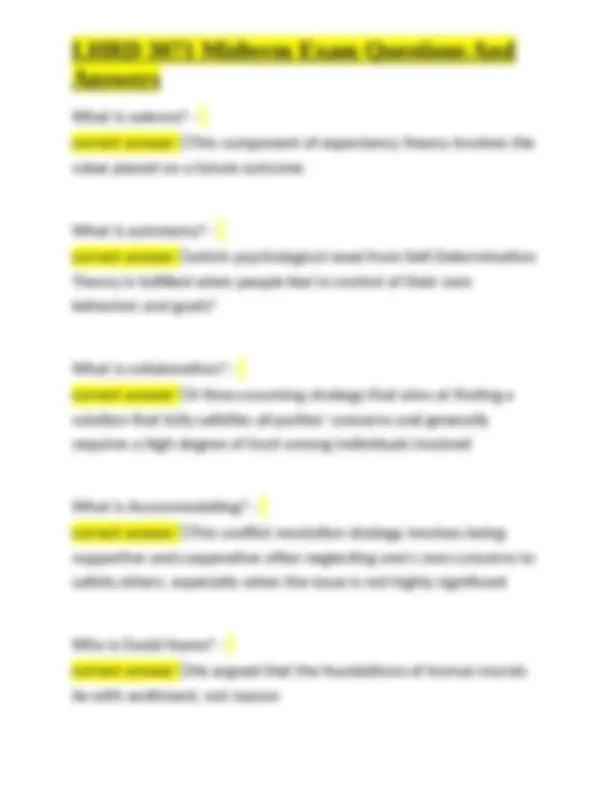
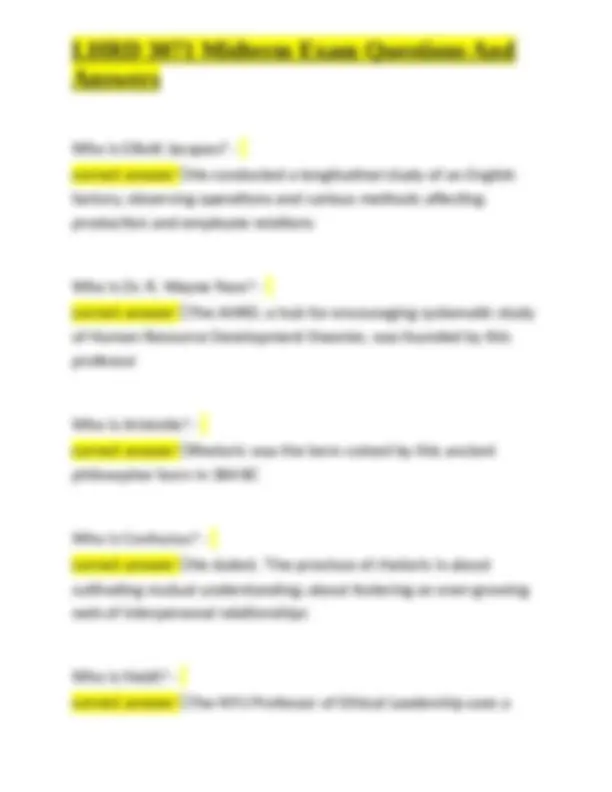
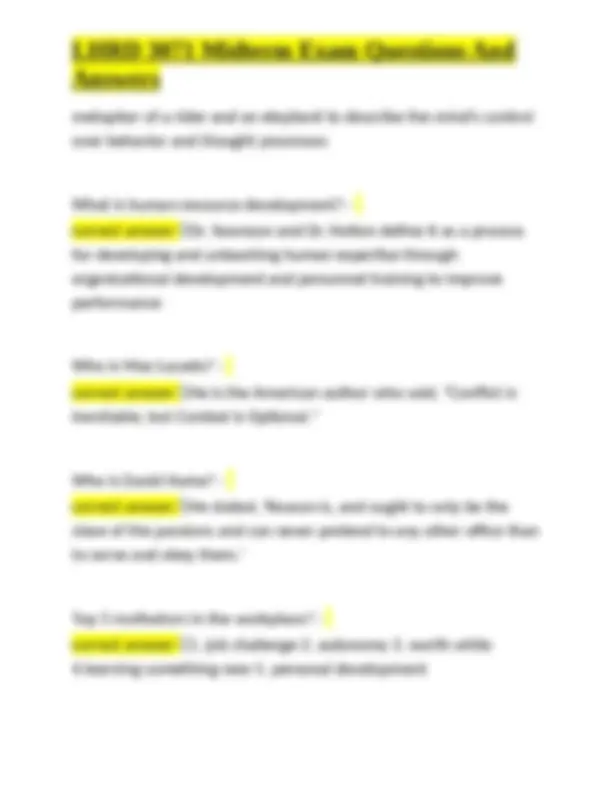
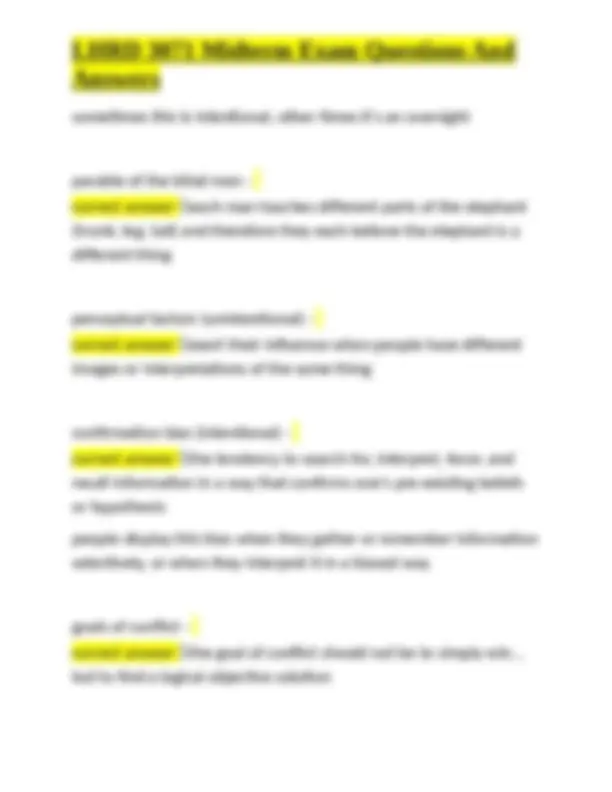
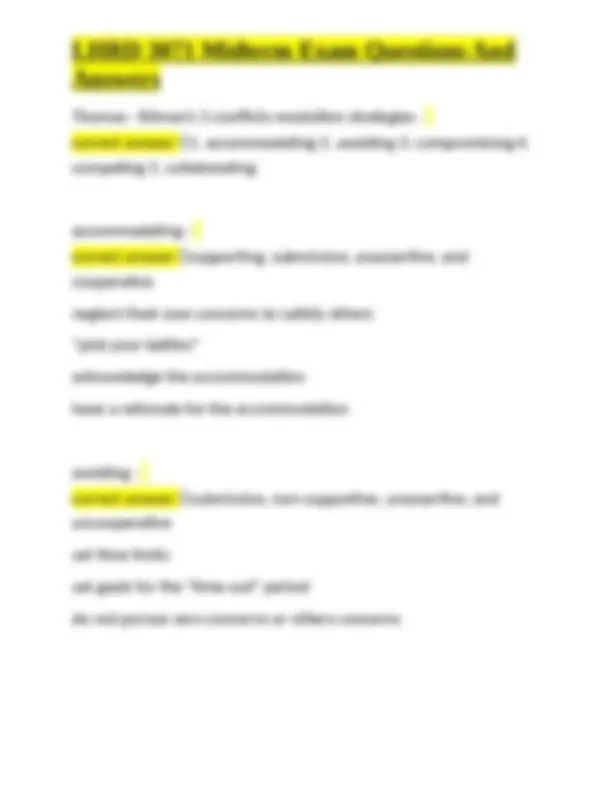
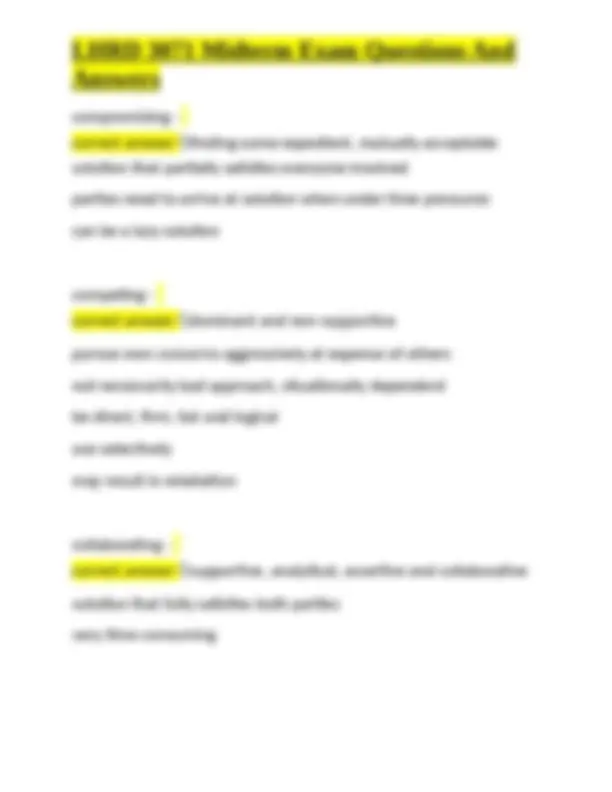
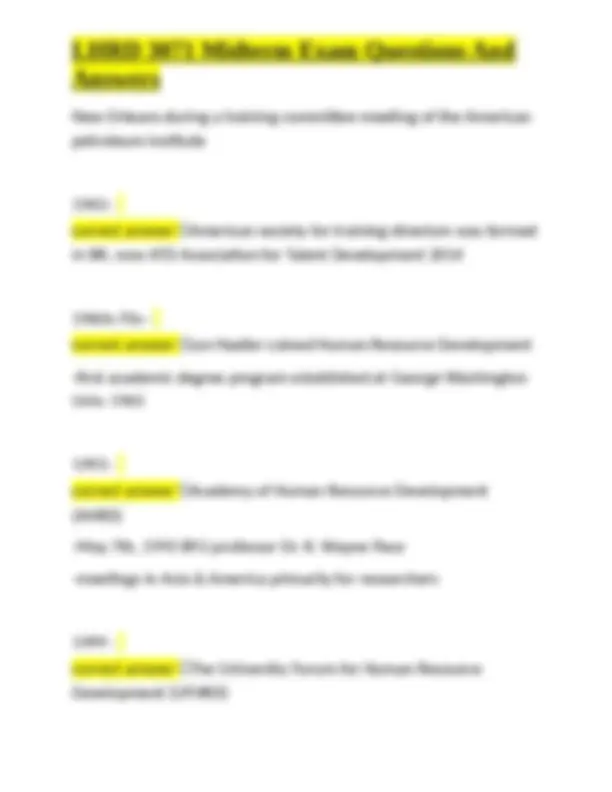
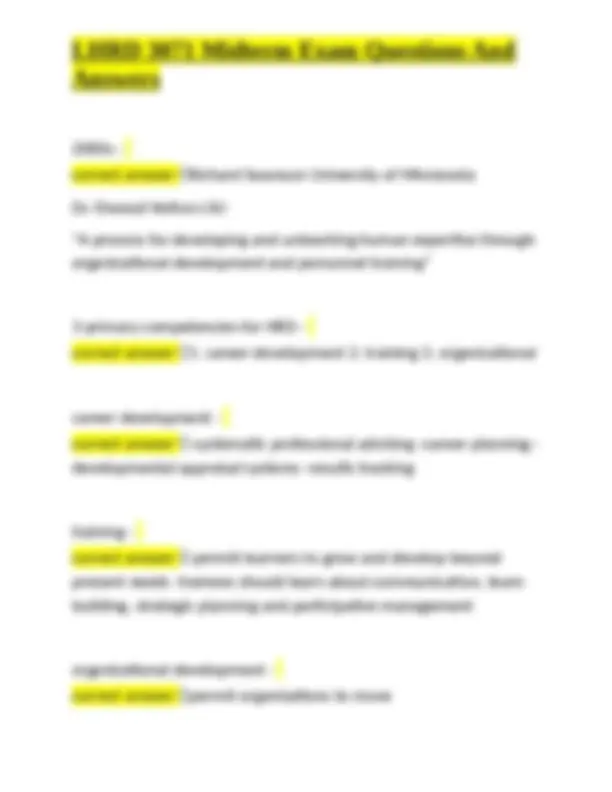
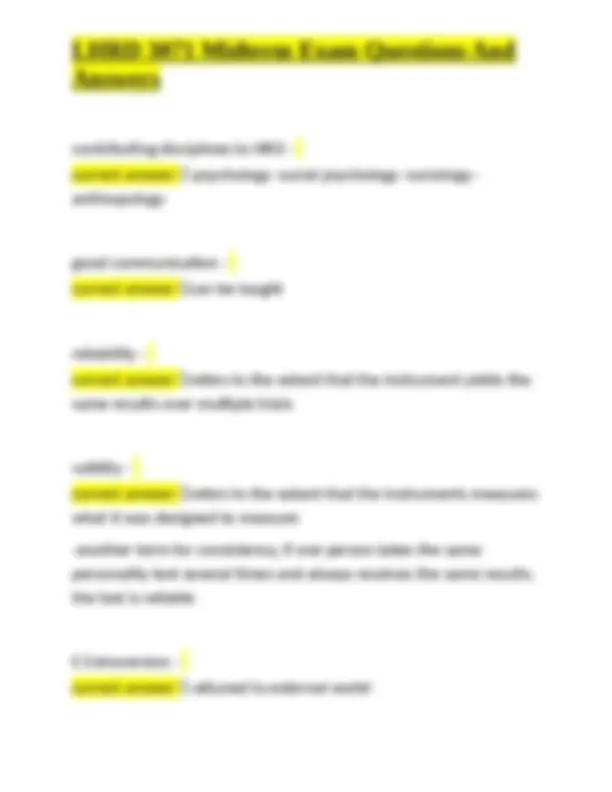
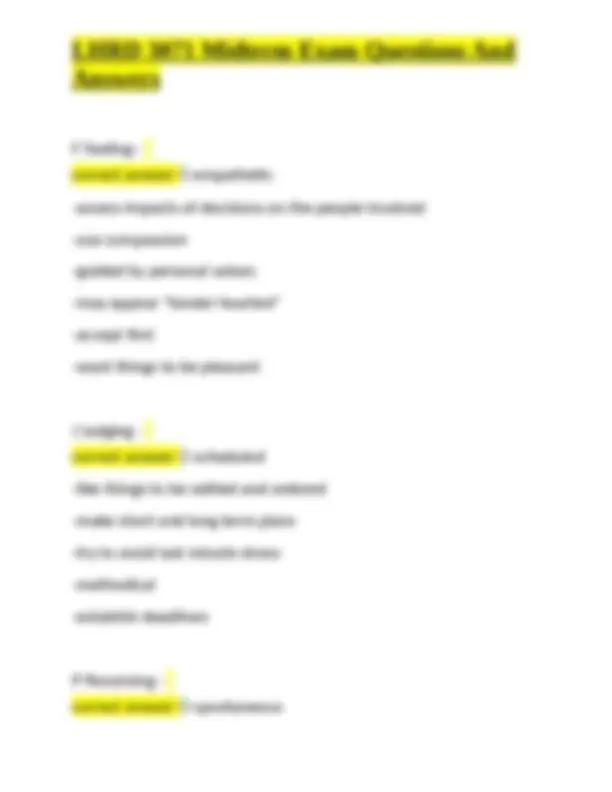
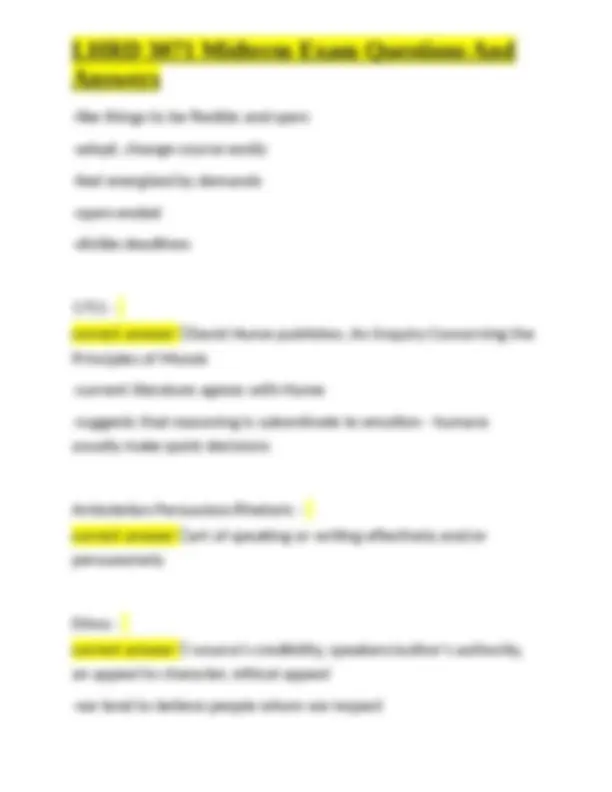
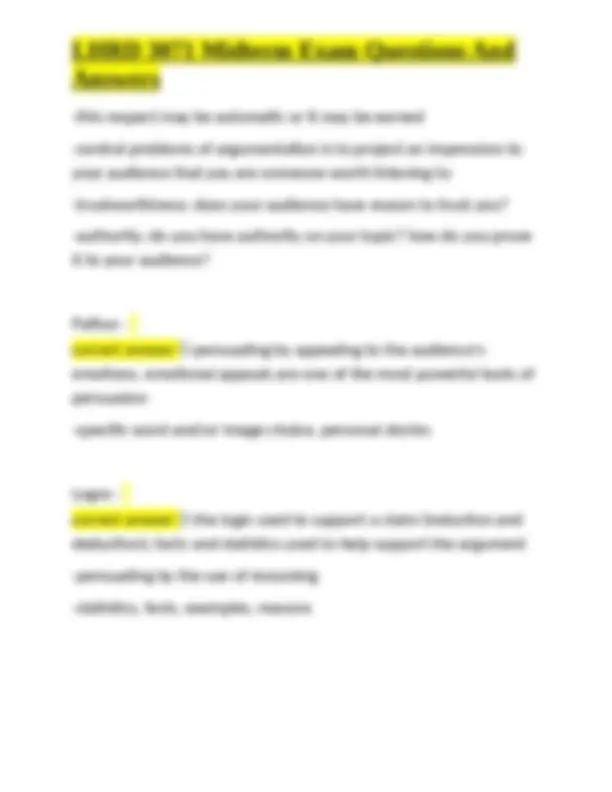
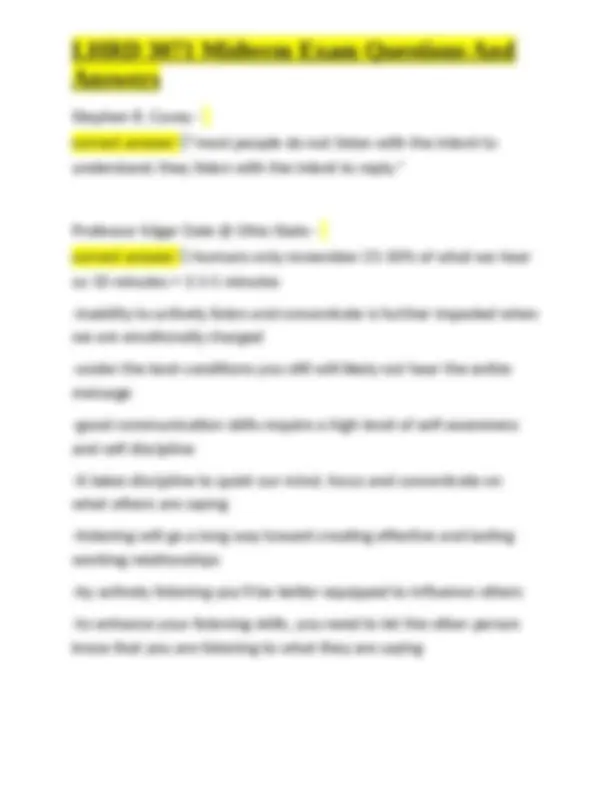
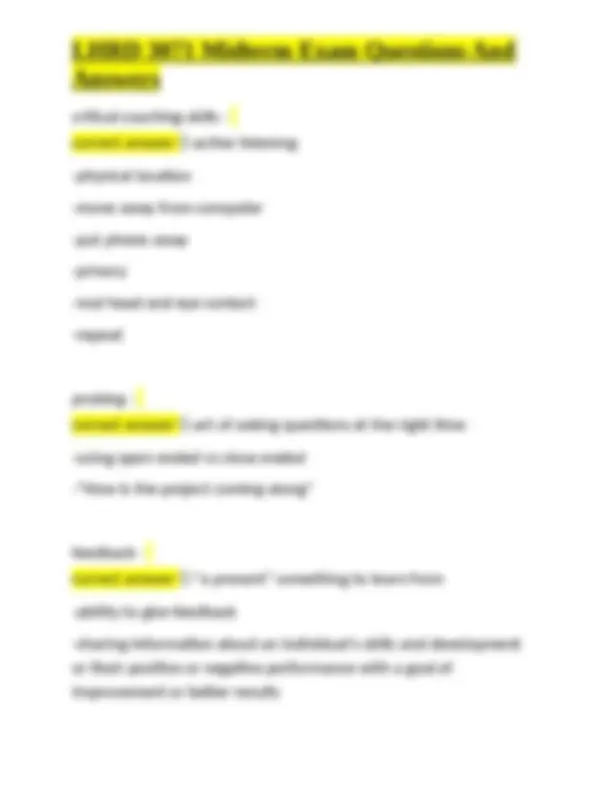



Study with the several resources on Docsity

Earn points by helping other students or get them with a premium plan


Prepare for your exams
Study with the several resources on Docsity

Earn points to download
Earn points by helping other students or get them with a premium plan
Community
Ask the community for help and clear up your study doubts
Discover the best universities in your country according to Docsity users
Free resources
Download our free guides on studying techniques, anxiety management strategies, and thesis advice from Docsity tutors
LHRD 3071 Midterm Exam Questions And Answers
Typology: Exams
1 / 23

This page cannot be seen from the preview
Don't miss anything!
















What is being productive, sometimes even more than average employees? - correct answer ✅Though often showing negative interpersonal behaviors, this characteristic of high conflict employees can sometimes obscure their disruptive impact What is instrumentality? - correct answer ✅This component of the expectancy theory relates to the belief that a given performance level will lead to a specific outcome Who is Leonard Nadler? - correct answer ✅He coined the phrase Human Resource Development after completing a doctorate in education from Columbia University What is Competence, autonomy, and psychological relatedness - correct answer ✅This type of self-perception is usually inflated among high conflict employees when assessing their professional skills
What is keeping an open mind? - correct answer ✅When dealing with a colleague with whom you've had negative encounters in the past, this approach urges you you to not make assumptions and instead analyze situations without letting feelings guide your perception What is extrinsic motivation? - correct answer ✅The type of motivation, though often overly utilized by management, involves rewards such as bonuses and raises What is intrinsic motivation? - correct answer ✅According to Dr. Gibbons' personal observation and experience, this type of motivation tends to have a longer- lasting impact on employees These researchers developed the theory suggesting that people are motivated by three innate and universal psychological needs: competence, autonomy, and psychological relatedness - correct answer ✅According to Deci, utilizing this type of rewards for a behavior that is already driven by intrinsic motivation may undermine autonomy
Who is Elliott Jacques? - correct answer ✅He conducted a longitudinal study of an English factory, observing operations and various methods affecting production and employee relations Who is Dr. R. Wayne Pace? - correct answer ✅The AHRD, a hub for encouraging systematic study of Human Resource Development theories, was founded by this professor Who is Aristotle? - correct answer ✅Rhetoric was the term coined by this ancient philosopher born in 384 BC Who is Confucius? - correct answer ✅He stated, 'The province of rhetoric is about cultivating mutual understanding; about fostering an ever-growing web of interpersonal relationships Who is Haidt? - correct answer ✅The NYU Professor of Ethical Leadership uses a
metaphor of a rider and an elephant to describe the mind's control over behavior and thought processes What is human resource development? - correct answer ✅Dr. Swanson and Dr. Holton define it as a process for developing and unleashing human expertise through organizational development and personnel training to improve performance Who is Max Lucado? - correct answer ✅He is the American author who said, "Conflict is Inevitable, but Combat is Optional." Who is David Hume? - correct answer ✅He stated, 'Reason is, and ought to only be the slave of the passions and can never pretend to any other office than to serve and obey them.' Top 5 motivators in the workplace? - correct answer ✅1. job challenge 2. autonomy 3. worth while 4.learning something new 5. personal development
Richard Ryan Self-Determination Theory - correct answer ✅1. competence 2. autonomy 3. relatedness competence - correct answer ✅gain mastery of tasks and learn different skills when people feel that they have the skills needed for success, they are more likely to take actions autonomy - correct answer ✅people need to feel in control of their own behaviors and goals this sense of being able to take direct action that will result in real change plays a major part in helping people feel self-determined relatedness - correct answer ✅people need to experience a sense of belonging and attatchment to other people informational factors - correct answer ✅came into play when people have developed their point of view on the basis of a different set of factors
sometimes this is intentional, other times it's an oversight parable of the blind men - correct answer ✅each man touches different parts of the elephant (trunk, leg, tail) and therefore they each believe the elephant is a different thing perceptual factors (unintentional) - correct answer ✅exert their influence when people have different images or interpretations of the same thing confirmation bias (intentional) - correct answer ✅the tendency to search for, interpret, favor, and recall information in a way that confirms one's pre-existing beliefs or hypothesis people display this bias when they gather or remember information selectively, or when they interpret it in a biased way goals of conflict - correct answer ✅the goal of conflict should not be to simply win... but to find a logical objective solution
compromising - correct answer ✅finding some expedient, mutually acceptable solution that partially satisfies everyone involved parties need to arrive at solution when under time pressures can be a lazy solution competing - correct answer ✅dominant and non-supportive pursue own concerns aggressively at expense of others not necessarily bad approach, situationally dependent be direct, firm, fair and logical use selectively may result in retaliation collaborating - correct answer ✅supportive, analytical, assertive and collaborative solution that fully satisfies both parties very time consuming
expectancy theory - correct answer ✅one of the best diagnostic theories for motivation based on 3 employee beliefs -expectancy -instrumentality -valence equity - correct answer ✅worker's perceptions of the fairness of outcomes they receive on the job equity judgements are social comparisons maintaining equity - correct answer ✅- Perceptions are important... two people may perceive the same thing differently
New Orleans during a training committee meeting of the American petroleum institute 1943 - correct answer ✅American society for training directors was formed in BR, now ATD Association for Talent Development 2014 1960s-70s - correct answer ✅Len Nadler coined Human Resource Development -first academic degree program established at George Washington Univ. 1965 1993 - correct answer ✅Academy of Human Resource Development (AHRD) -May 7th, 1993 BYU professor Dr. R. Wayne Pace -meetings in Asia & America primarily for researchers 1999 - correct answer ✅The University Forum for Human Resource Development (UFHRD)
2000s - correct answer ✅Richard Swanson University of Minnesota Dr. Elwood Holton LSU "A process for developing and unleashing human expertise through organizational development and personnel training" 3 primary competencies for HRD - correct answer ✅1. career development 2. training 3. organizational career development - correct answer ✅-systematic professional advising -career planning - developmental appraisal systems -results tracking training - correct answer ✅-permit learners to grow and develop beyond present needs -trainees should learn about communication, team building, strategic planning and participative management organizational development - correct answer ✅permit organizations to move
-prefer to communicate by talking -sociable and expressive -learn best through doing -broad interest -action over reflection I introversion - correct answer ✅-drawn to inner world -prefer to communicate in writing -private and contained -learn best by mental practice -in depth interest -reflection over action S sensing - correct answer ✅-factual and concrete -focus on what is real and actual -trust experience -oriented to present realities
-build conclusions carefully -like examples -prefer agendas N iNtuition - correct answer ✅-verbally creative -focus on pattern -trust inspiration -oriented to future possibilites -follow hunches -big picture oriented -desire change T Thinking - correct answer ✅-analytical -solve problems with logic use reason to 'solve problems' -question first -want things to be logical
-like things to be flexible and open -adapt, change course easily -feel energized by demands -open-ended -dislike deadlines 1751 - correct answer ✅David Hume publishes, An Enquiry Concerning the Principles of Morals -current literature agrees with Hume -suggests that reasoning is subordinate to emotion - humans usually make quick decisions Aristotelian Persuasion/Rhetoric - correct answer ✅art of speaking or writing effectively and/or persuassively Ethos - correct answer ✅-source's credibility, speakers/author's authority, an appeal to character, ethical appeal -we tend to believe people whom we respect
-this respect may be automatic or it may be earned -central problems of argumentation is to project an impression to your audience that you are someone worth listening to -trustworthiness: does your audience have reason to trust you? -authority: do you have authority on your topic? how do you prove it to your audience? Pathos - correct answer ✅-persuading by appealing to the audience's emotions, emotional appeals are one of the most powerful tools of persuasion -specific word and/or image choice, personal stories Logos - correct answer ✅-the logic used to support a claim (induction and deduction); facts and statistics used to help support the argument -persuading by the use of reasoning -statistics, facts, examples, reasons